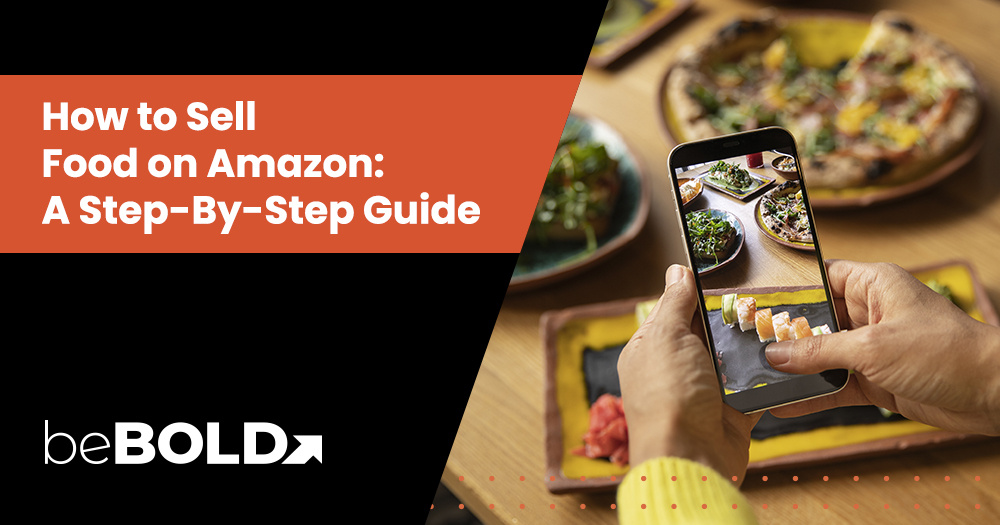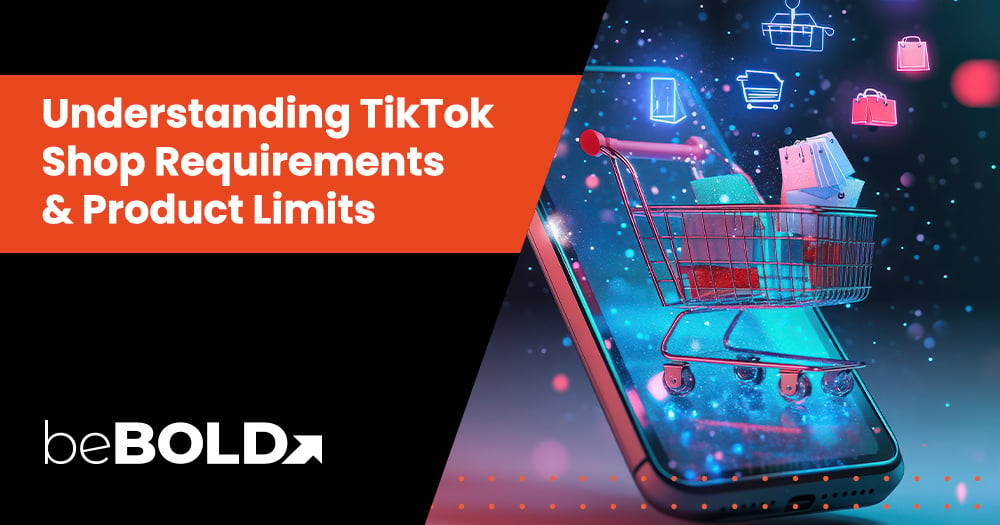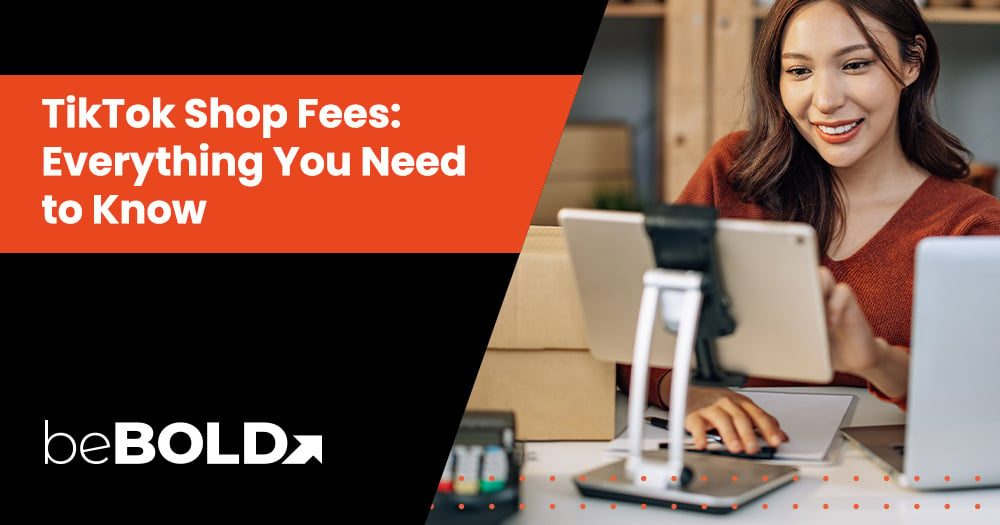An emerging opportunity in eCommerce you can't ignore revolves around selling food products on Amazon. Recent statistics show that Amazon's online grocery could rise from $35.46 billion in 2023 to $41.17 billion in 2024. Amazon's Fresh storefront is constantly growing with new products, which is indicative of how eCommerce as a whole continues to change.
Thinking of entering the Food & Beverage market on Amazon? This guide covers the essentials—guidelines, approvals, and best practices—to help you get started quickly.
Key Points Covered:
- Selling food on Amazon provides access to a large customer base and scalable fulfillment options.
- Compliance with food safety regulations, including proper labeling and packaging, is crucial to avoid penalties.
- Approval for the Grocery & Gourmet Food category requires submitting necessary documentation.
- Choosing between FBA (Prime eligibility) and FBM (lower costs, more control) affects logistics and profitability.
- Temperature-sensitive foods require specialized packaging and adherence to shipping regulations.
- Optimized product listings with strong SEO improve visibility and sales.
- Effective inventory management prevents stockouts, minimizes storage fees, and ensures product freshness.
How to Sell Food on Amazon? A Beginner's Guide

Amazon is among the top brands in the world for a reason. Their strict adherence to high quality on their platform means that learning how to get approved to sell food on Amazon is an integral first step for any aspiring food entrepreneur.
1. Research Amazon's requirements
Before you start selling food, you must ensure compliance with Amazon’s regulations. These include requirements for sellers, products, and listings.
Seller Requirements
- Amazon Professional Seller Account: You must sign up for a professional seller account, which requires a monthly subscription fee.
- Tax Documentation: Ensure you have a valid Tax Identification Number or equivalent documentation based on your country.
- Bank Account: Provide a valid bank account for receiving payouts.
Product Requirements
- Food Safety Compliance: All food products must comply with regulations set by relevant authorities, such as the FDA, USDA or other governing bodies in your country.
- Shelf-Life and Expiration Dates: Clearly display expiration or "best by" dates on all products. Amazon has strict policies regarding perishable items, and products with short shelf lives may be subject to additional restrictions or shorter selling windows to ensure freshness for customers.
- Proper Packaging and Labeling: Use tamper-evident, sealed, and durable packaging to maintain product integrity during shipping. Labels must include all necessary information, such as ingredient lists, nutritional facts, allergen warnings, and country of origin.
- Temperature Control: Certain food items, such as refrigerated, frozen, or heat-sensitive products, require specific temperature-controlled packaging to prevent spoilage. Sellers must use insulated containers, gel packs, or dry ice when necessary to ensure products arrive in optimal condition.
Below is a table on the temperature guidelines for perishable foods on Amazon:
|
Food Type |
Recommended Storage Temperature |
|
Refrigerated Meat |
28-41°F (-2 to 5°C) |
|
Refrigerated poultry |
28-41°F (-2 to 5°C) |
|
Refrigerated seafood |
32-41°F (0 to 5°C) |
|
Refrigerated processed dairy (cheese, yogurt) |
32-41°F (0 to 5°C) |
|
Refrigerated processed foods |
32-41°F (0 to 5°C) |
|
Cut fruits, vegetables, and pre-packaged produce |
32-41°F (0 to 5°C) |
|
Refrigerated shellfish (oysters, mussels, clams, scallops) |
32-45°F (0 to 7°C) |
|
Refrigerated eggs and fresh milk |
32-45°F (0 to 7°C) |
|
Frozen foods (meat, seafood, processed items) |
Below 10°F (-12°C) |
|
Whole, unprocessed produce (uncut fruits & vegetables) |
32-65°F (0 to 18°C) |
|
Bananas |
56-64°F (13 to 18°C) |
Product Listing Requirements
- Adhere to Amazon’s Grocery Style Guide: Follow Amazon’s formatting, image, and content requirements for grocery product listings.
- Clearly State Dietary and Allergen-Free Claims: Accurately label products as organic, gluten-free, non-GMO, keto, or vegan.
- Comply with Bundle and Multi-Pack Guidelines: Ensure that you meet Amazon Bundle Policy if you are creating bundles for grocery items. If selling multi-packs, mention the expiration date on the outer package. For variety packs ensure a clear list of all the contents are mentioned.
- Avoid Restricted Grocery Items: Go through the restricted list for prohibited items like raw milk and specific plant-based items.
- Include Price Per Unit (PPU): Amazon mandates PPU for grocery items to help customers compare product value. Ensure accurate unit pricing in the listing.
- Set Competitive Pricing: Factor in Amazon’s referral fees, FBA fulfillment costs, and other expenses while maintaining competitive prices in the grocery category.
Criteria to qualify for Grocery & Gourmet Food Category:
There are a few criteria you must meet to qualify for the Grocery & Gourmet Food Category:
- An order defect rate of less than 1%
- A pre-fulfillment cancel rate of less than 2.5%
- A late shipment rate of less than 4%
Their official Amazon Grocery & Gourmet Food page outlines several other requirements you must meet, including the following:
- You must have a license and approval from the government agency relevant to the product you're selling.
- You must have an expiration date marked on every unit.
- Your packaging must protect the food from contamination, spoiling, and melting.
It will also help to study the following government guidelines to ensure the food you plan to sell is safe and meets Amazon's standards:
- Amazon Item Package Quantity guidelines
- Amazon Bulk and Commodity Food Listing Policies
- FDA's Food Labeling Guide
- FDA's Pet Food regulations
- U.S. Department of Agriculture Labeling and Label Approval guidelines
2. Create an Amazon Seller Account

Step 1:
Visit Amazon Seller Central and sign up for a Professional Seller Account. It has enhanced features like bulk listing and access to advanced tools.

Step 2:
The next step is to enter your business details. Fill out information such as your legal business name, contact information, and tax details.

Step 3:
The next step is to set up a payment method. Link your bank account details to receive payments from Amazon.
3. Prepare and Submit Your Business Information
Ensure you have the necessary documents and certifications to avoid delays during the setup process. According to Amazon, you'll need to prepare and submit the following information:
- Business License: Verifies your legitimacy as a seller.
- Food Safety Certificates: Ensures compliance with regulations for handling and selling food products.
- Supplier Invoices: Amazon may request invoices from your suppliers to verify product authenticity and sourcing.
The details you provide should be updated and accurate. You can also follow Amazon's grocery style guide to help you when you're listing products on the site.
4. Source Reliable Suppliers
Sourcing turns the idea of what you could sell on Amazon into something closer to reality. The suppliers you find can often determine the quality of the food products you'll sell, whether they arrive pre-packaged or as ingredients you receive to prepare the meals yourself.
Choosing the right supplier is critical for maintaining quality and consistency. You can choose between private label, wholesale or online arbitrage.
5. Obtain Category Approval
Many food products require approval before they can be listed on Amazon. Steps to get approval include:
Application Submission

Go to Seller Central and apply for the relevant category (e.g., Grocery & Gourmet Foods).
Document Verification

Submit invoices, product images, and certifications proving compliance with food safety standards.
How to Get Approval for Grocery and Gourmet Food
Amazon places the Grocery & Gourmet Food category under restricted (gated) categories to ensure compliance with food safety regulations and quality standards. This restriction helps protect consumers by ensuring that only approved, high-quality, and compliant food products are sold.
To request category approval, log into Amazon Seller Central and navigate to Inventory > Add a Product. Search for a product in the Grocery & Gourmet category or enter the ASIN of a specific product you want to sell. Click "Apply to sell" and submit the required documentation for review.
Amazon will review your submission, which may take a few days to a few weeks. If approved, you’ll be ungated and allowed to list products in the Grocery & Gourmet category. And, if rejected, check the reason for denial, correct issues, and resubmit your application.
Troubleshooting Tips for Rejected Applications:
- Double-check the completeness of your documents.
- Ensure your product packaging meets labeling and safety requirements.
- Contact Seller Support for clarity on rejection reasons.
6. Choose Your Fulfillment Option

Your fulfillment process is integral to your success as an Amazon seller. You have the choice between two fulfillment options: FBA and FBM. There are pros and cons to each, and countless business owners have debated the FBA vs. FBM issue in the past. Ultimately, it depends on your product's characteristics, sales volume, and target audience, to name a few.
An element related to order fulfillment that you can't overlook is storage and inventory. Food products are perishable, meaning you'll need to find a place to store them that maintains their freshness by the time they reach a customer's doorstep.
A great way to ensure products don't remain in storage for long is to employ excellent Amazon marketing strategies. For instance, utilizing targeted advertising campaigns to reach potential customers who are actively searching for similar products can significantly boost visibility and sales.
Optimizing product listings with high-quality images, compelling descriptions, and relevant keywords can enhance search rankings and attract more traffic to your listings. Additionally, leveraging features like Amazon Prime and customer reviews can instill trust and confidence in potential buyers, increasing the likelihood of purchases and reducing storage time for products.

Advantages and Disadvantages of Different Fulfillment Methods
Advantages of FBA
- Prime Eligibility & Faster Shipping – FBA boosts visibility and conversions with free, expedited Prime shipping.
- Reduced Logistics Burden – Amazon handles storage, packing, shipping, returns, and customer service.
- Global Market Access – Sell internationally with Amazon’s FBA.
- Improved Customer Trust – Amazon’s reliable service increases buyer confidence.
Disadvantages of FBA
- Higher Fees – Storage, fulfillment, and long-term fees, especially for oversized or perishable items.
- Less Inventory Control – Stock levels, damages, and overstocking depend on Amazon’s fulfillment process.
- Limited Branding & Packaging – Standardized Amazon packaging restricts custom branding and inserts.
Advantages of FBM
- Control Over Shipping – Choose carriers, customize packaging, and handle special delivery needs.
- Lower Costs – Avoid FBA fees, ideal for oversized or low-margin products, and leverage existing logistics.
- Inventory Flexibility – Manage stock directly, control storage conditions, and offer custom bundles or inserts.
Disadvantages of FBM
- High Time & Cost Demand – Sellers manage warehousing, packing, and shipping, requiring significant effort and investment.
- Reduced Visibility – FBM products lack Prime eligibility, lowering search rankings and appeal to fast-shipping customers.
- Customer Service Burden – Handling inquiries, returns, and complaints falls entirely on the seller, posing challenges for smaller businesses.
|
Feature |
Fulfillment by Amazon (FBA) |
Fulfillment by Merchant (FBM) |
|
Prime Eligibility |
Eligible for Amazon Prime, increasing visibility and sales potential. |
Not eligible for Prime, reducing appeal to customers who prefer fast shipping. |
|
Logistics Management |
Amazon handles storage, packing, shipping, and returns, reducing operational burden. |
The seller handles all logistics, requiring time and resources for storage and shipping. |
|
Customer Service |
Amazon manages customer inquiries, complaints, and returns. |
The seller is responsible for all customer service and returns. |
|
Costs |
Higher fees, including storage, fulfillment, and long-term storage fees. |
Lower fees since Amazon does not handle logistics, but sellers bear logistics costs. |
|
Control |
Less control over inventory, packaging, and branding. |
Full control over inventory management, packaging, and shipping methods. |
|
Scalability |
Easily scalable with Amazon’s logistics network. |
Scalability depends on the seller’s resources and infrastructure. |
|
Inventory Risks |
Risk of overstocking or stockouts at Amazon fulfillment centers. |
Seller directly manages inventory and bears risks of storage and spoilage. |
|
Ideal for |
High-volume sellers, small and lightweight products, and sellers seeking quick scalability. |
Low-volume sellers, oversized or niche products, or those wanting full control. |
7. Ensure Product Compliance With Amazon’s Policies
Selling food products on Amazon requires strict adherence to both Amazon’s internal guidelines and local regulatory standards. Here are the key areas to focus on:
Packaging and Labeling
- Accurate Labels: Labels must include the product name, net weight, ingredients, allergen information, nutritional facts, expiration date, and storage instructions.
- Tamper-Evident Packaging: Products should be sealed in packaging that indicates if it has been opened or tampered with.
- Professional Presentation: Ensure packaging is clean, professional, and durable to protect the product during shipping and storage.
Temperature Control
- Perishable Goods: If you sell temperature-sensitive items like frozen foods or dairy products, ensure they are stored and shipped under the required temperature conditions.
- Insulated Packaging: Use insulated boxes and ice packs for shipping perishable items.
- Compliance with Regulations: Verify that your shipping methods meet food safety regulations for your target region.
Regulatory Compliance
- Local Food Laws: Adhere to laws and guidelines such as FDA regulations for labeling, packaging, and safety in the US.
- Certifications: Products marketed as organic, kosher, gluten-free, or non-GMO must have proper certifications.
- Export/Import Rules: For international sales, ensure compliance with import/export restrictions and labeling laws specific to the destination country.
8. List Your Food Products on Amazon

An optimized product listing is essential for increasing visibility and driving sales. Here are the essential components to consider:
- Title: Include key features like name, size, brand, and unique selling points with relevant keywords (e.g., Organic Gluten-Free Granola Bars – 12-Pack – Non-GMO and Vegan).
- Bullet Points: Highlight top benefits in short, clear points (e.g., Healthy and Delicious – Made with 100% organic oats).
- Images: Use high-resolution photos, close-ups of labels/ingredients, and lifestyle shots to enhance appeal.
A+ Content (Enhanced Brand Content)

- If you’re a registered brand, use A+ Content to enhance your listing with additional visuals and storytelling.
- Add comparison charts, videos, and infographics to highlight your product’s advantages.
Also Read: How to Boost your Amazon Product Ranking in 2025
9. Market and Promote Your Food Products
Marketing is critical for boosting sales, especially in a competitive category like food. Below are a few effective marketing strategies to consider:
Amazon Ads

- Sponsored Products: Target specific keywords to appear in search results and product detail pages.
- Sponsored Brands: Showcase your brand logo and multiple products at the top of search results.
- Display Ads: Use visually appealing ads to retarget customers who have viewed your product or similar items.
SEO Optimization
- Conduct keyword research to find relevant terms customers are searching for (e.g., “organic snacks” or “healthy granola bars”).
- Incorporate these keywords into your product title, bullet points, description, and backend search terms.
Social Media Promotion
- Build an audience on platforms like Instagram, Facebook, and TikTok. Post high-quality photos, videos, and user testimonials to showcase your products.
- Collaborate with influencers or food bloggers to increase visibility and credibility.
10. Manage Inventory and Monitor Performance
Effective inventory and performance management are essential for maintaining a strong seller account and ensuring long-term success.
Inventory Management
- Track Stock Levels: Use Amazon’s Inventory Dashboard and forecasting tools to prevent stockouts or overstocking.
- Plan for Seasonal Fluctuations: Adjust inventory for peak demand during holidays or seasonal trends.
- Manage Perishables: Ship and sell items before expiration; use FBA tools to track inventory age and avoid extra fees.
- Monitor Customer Reviews: Address feedback promptly to improve product quality and customer satisfaction.
- Maintain Low ODR: Ensure timely shipments, accurate listings, and high-quality products to keep order defect rate low.
- Track Account Health: Regularly check the Account Health Dashboard to stay compliant with Amazon’s policies.
Private Label vs. Wholesale vs. Online Arbitrage: Which is the Best Source for Selling Food on Amazon?
Private Label
Private labeling involves sourcing a product from a manufacturer and selling it under your own brand. It offers control over branding, higher profit margins, and long-term customer loyalty but requires significant upfront investment in product development and marketing.
Best for sellers aiming to build a scalable brand with dedicated time and resources.
Wholesale
Wholesale involves buying food products in bulk from established brands or manufacturers and reselling them on Amazon. It requires lower upfront investment than private labeling and offers an easier setup with access to in-demand brands. However, it comes with lower profit margins, high competition, and possible restrictions from manufacturers.
Ideal for sellers looking for a straightforward entry into the market without heavy branding efforts.
Online Arbitrage
Online arbitrage involves purchasing discounted or clearance food products from online or local stores and reselling them on Amazon. It offers low startup costs and quick turnaround, making it ideal for beginners testing the market. However, it can be time-intensive, difficult to scale, and result in inconsistent inventory.
Best suited for new sellers seeking a low-risk entry into Amazon food sales.
Pros and Cons of Selling Food on Amazon
|
Pros |
Cons |
|
Access to a Massive Customer Base |
Compliance with Food Safety Regulations |
|
Increased Visibility and Discoverability |
Managing Inventory for Perishable Goods |
|
Convenient Fulfillment Options |
High Competition and Price Wars |
|
Scalability and Growth Potential |
Shipping Challenges for Perishables |
|
Access to Tools for Marketing and Promotion |
Managing Product Returns |
|
Access to Prime shipping |
Meeting Amazon's Performance Standards |
Selling food on Amazon offers both significant opportunities and challenges. Here are the key pros and cons to consider when deciding whether to sell food on Amazon:
Pros: Benefits of Selling Food on Amazon

1. Access to a Massive Customer Base
Amazon has a vast, global reach, with millions of active customers. Selling food on this platform exposes your products to a diverse audience, from everyday shoppers to food enthusiasts, enabling you to tap into a massive customer base.
2. Increased Visibility and Discoverability
With the right optimization, your food products can easily be discovered by potential customers. Amazon’s powerful search algorithms and product recommendations increase the chances of your products being featured to people who are actively looking for food items.
3. Convenient Fulfillment Options
Amazon offers FBA (Fulfillment by Amazon), which allows sellers to store their food items in Amazon’s warehouses. This service handles packaging, shipping, and customer service, freeing up time for sellers to focus on growing their business.
4. Scalability and Growth Potential
Amazon's platform is designed to scale. Whether you’re just starting out or looking to expand, you can easily increase your product offerings, grow your brand, and reach new markets without worrying about infrastructure or logistics.
5. Access to Tools for Marketing and Promotion
Amazon offers marketing tools like sponsored ads, discounts, and Prime integration to boost visibility and drive sales, especially with strategic SEO.
Cons: Common Challenges and How to Overcome Them

1. Compliance with Food Safety Regulations
Selling food on Amazon requires compliance with FDA and local food safety regulations. Non-compliance can lead to penalties or removal. Stay updated and ensure products meet all standards before listing.
2. Managing Inventory for Perishable Goods
Perishable food items require careful inventory management to ensure they don’t spoil before reaching customers. Sellers need to monitor expiration dates closely, rotate stock, and use Amazon's inventory management tools to keep track of stock levels and manage demand.
3. High Competition and Price Wars
Amazon's food category is competitive, but sellers can stand out with unique packaging, quality products, great service, and strong branding instead of competing on price.
4. Shipping Challenges for Perishables
Shipping perishables requires proper packaging to maintain freshness. Sellers can use Amazon FBA or partner with third-party logistics for safe, timely delivery.
5. Managing Product Returns
Food returns can be complex as they're often non-returnable. To reduce issues, sellers should focus on secure packaging, accurate product descriptions, and customer satisfaction guarantees to prevent complaints and disputes.
6. Meeting Amazon's Performance Standards
Amazon requires sellers to meet strict performance metrics. Failure to do so can result in account suspension. Food sellers must ensure timely shipping, quality products, and strong customer service to stay compliant.
Maximize Your Potential in Amazon’s Food Market with beBOLD Digital’s Expertise!
Spotting growth opportunities is key to increasing revenue. With Amazon’s booming food market, now is the time to enter and stay ahead by tracking trends and adapting.
Ready to take your food business to new heights on Amazon? Partner with beBOLD Digital, your go-to Amazon SEO expert! From setting up your account to in-depth brand analysis and reporting, we’ve got you covered every step of the way.
Let’s work together to grow your Amazon food business and turn your vision into success—contact us today!
Start Serving Hungry Customers Online
Selling food on Amazon is a lucrative opportunity as the online grocery market grows. By meeting Amazon’s requirements, securing approvals, and using smart strategies, you can build a successful brand. Whether launching a new product or expanding your business, now is the time to capitalize on this thriving market.
Frequently Asked Questions
1. How profitable is selling food on Amazon?
Success depends on your product, marketing, and competition. With a growing demand for food on Amazon, the right strategy can lead to strong profits and growth.
2. Are there specific requirements to sell frozen food on Amazon?
Yes. Amazon requires temperature-controlled packaging for frozen, refrigerated, and raw food products to ensure freshness during shipping.
3. What is the best food to sell on Amazon?
Ideal products have high demand, low competition, and strong profit margins. Success depends on tracking market trends and spotting opportunities early.
4. Are any particular food items or beverages prohibited by Amazon?
Amazon bans foods that violate laws, contain harmful substances, or lack proper labeling, including unpasteurized dairy and most alcohol. Check the restricted list before listing.
5. Does Amazon allow items that expire quickly?
Amazon allows short shelf-life items if they meet regulations, have clear expiration dates, proper storage, and fast shipping. FBA helps ensure compliance.
6. How to approve multiple (food) orders at once?
To approve multiple food orders, go to "Manage Orders" in Seller Central and use bulk actions or third-party software for faster approvals and shipping.
7. What are the fees for selling on Amazon?
Amazon offers two plans: Individual ($0.99 per item) for under 40 sales/month and Professional ($39.99/month) for higher sales, with access to Grocery & Gourmet categories.
8. Does Amazon ship food?
Yes, Prime Members get Amazon Fresh orders in about 2 hours. Businesses must ensure fresh packaging to comply with Amazon's policies.
9. Do I need a license to sell on Amazon?
Yes, selling food on Amazon may require licenses based on product type and location. U.S. sellers must follow FDA, USDA, and state laws, obtaining necessary permits and certifications for specialty items.
Ready to grow with beBold Digital? Contact us today and start scaling your Amazon food business!










Comments